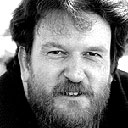
No figure in British contemporary music is more respected than Oliver Knussen. As a composer, conductor and teacher, he has championed more causes and given more generous help to composers at all stages of their careers than anyone else. So for every composer commissioned to produce a short piece to mark his 50th birthday, there were surely another half-dozen who would have jumped at the chance.
The London Sinfonietta certainly celebrated its music director's special day in style. A short concert with bespoke piano pieces by Charles Wuorinen, Julian Anderson, Hans Werner Henze and Robert Zuidam was followed by a lavish, three-part programme that interleaved Knussen's own ensemble pieces, conducted by the birthday boy himself, with another collection of tributes conducted by George Benjamin. Writing for a musical intelligence as stringent and penetrating as Knussen's must concentrate the mind wonderfully: each piece was a fully worked, cogent miniature, utterly characteristic of its composer.
From New York, Elliott Carter sent Au Quai, a pithy dialogue for viola and bassoon; from Amsterdam, Louis Andriessen offered his Very Sharp Trumpet Sonata, three movements compressed into a minute. Alexander Goehr's Only Two Notes for Olly was a sinewy elaboration of minimal material, Colin Matthews's Flourish with Fireflies a beautifully fashioned homage to Knussen's musical language and sources. Mark-Anthony Turnage's Snapshots played around a two-bar riff; Benjamin's Olicantus was an exquisite elaboration of a tiny, eloquent musical idea, while Magnus Lindberg acknowledged Knussen's fascination with owls in his Bubo Bubo (the scientific name for the eagle owl), borrowing some of the dedicatee's own material and building it into a terrific celebratory climax.
It was an exhilarating display of affection and admiration, set off by the performances of Knussen's own music: a survey that began with the 1969 Masks for peripatetic flute player and hidden musical chimes, and proceeded via the supercharged energy of Ophelia Dances (1975) and Coursing (1979) to the ravishing Two Organa of 1994. Nothing has dated; every piece makes its point perfectly and shows Knussen's mastery of his musical language and influences, nearly all mined from the rich seam of modernism in the years before the first world war. It is a precious achievement, and there is, surely, more of it to come.

